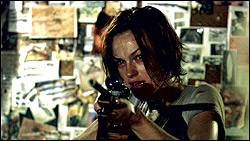Wolf Creek belongs to the genre of what might be called landscape horror films. This Aussie import, which opens Sunday, Dec. 25, at the Meridian and other theaters, is actually rather sparing in its shocks and fits of violence. Certainly the best, artiest serial-killer flick in years, it doesn’t linger over blood or make a snickering vid-game sport of killing. It has as much in common with the art-in-nature documentary Rivers and Tides as The Texas Chainsaw Massacre. Wolf Creek turns its longer attention to the red rocky contours of western Australia, to trees turned white with flocked birds, to the sun and moon, to the ocean waves on the coast where three tourists begin their drive back to Sydney, and especially to the eerie meteorite crater in Wolf Creek Crater National Park—a large, puckered fissure in the planet, almost like a wound, formed by an instant of random, unfathomable calamity.
Why did the meteorite choose that particular place to fall in the desert, asks Liz (Cassandra Magrath). “Maybe it was drawn to something in the earth,” says Ben (Nathan Phillips) during their visit. Only discovered by white European colonists in 1947, the crater is like a Robert Smithson earthwork created about 300,000 years ago, a half-mile across. Hiking there with Kristy (Kesti Morassi), the third member in their lithe young party of twentysomethings, these tourists feel very small indeed. Though Liz and Ben venture a tentative kiss, this is not a romantic setting. As in Picnic at Hanging Rock or A Cry in the Dark, there’s something ominous and forbidding about this waterless terrain: It’s beautiful, but at the same time inhospitable. Unlike the quick montage we see of the three drinking and cavorting back at the beach, this is a place that emphatically doesn’t want people there.
Car trouble strands them at the crater, however, and their uneasy bivouac recalls The Blair Witch Project with flashlights and fear of the dark, desolate wilderness. (The girls are from England and Ben from Sydney; none of them is a hardy outback type like Crocodile Dundee.) Then they are delivered, in a way—delivered into something much worse than they might’ve imagined. It takes a full mellow hour for the minimal plot to be sprung here, since writer-director Greg McLean wants us to get to know the amiable trio. In a low-grade horror flick, we might expect to see them punished for some act of transgression, but these are simply decent kids following their Lonely Planet guide.
To preserve your surprise, I’ll spare you the gory particulars of how and why they fall off the map. Wolf Creek was inspired by true stories of missing tourists, as suggested in a postscript. The drama and violence are mainly conjectural— hypothesizing the answer to a mystery without resorting to the supernatural, aliens, or monsters. Instead, the predator is an indigenous species, the product of an unforgiving, unknowable landscape shaped by austerity and violence. Why did the meteorite strike there? Why do these tourists visit the crater? Why does a killer stalk them? All of them, seemingly acting under the same mysterious forces, are simply drawn to the earth.








